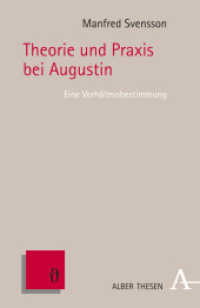Full Description
Elgar Research Agendas outline the future of research in a given area. Leading scholars are given the space to explore their subject in provocative ways, and map out the potential directions of travel. They are relevant but also visionary.
Asking vital questions concerning the future directions of terrorism research, this topical Research Agenda dives into the current state, emerging methodologies and key trends of this emotive and controversial field.
Structured in four distinct sections, the book initially explores the major perspectives in terrorism studies research, before taking a theoretical approach to assess its methodologies including ethnography, interviews, social media and databases. Using a broad range of case studies, the book then tackles the major debates and controversies facing terrorism research today, including gender issues, the private sector, and ethics. Exploring the strengths, weaknesses and policy and practice impacts of this research, the book concludes with a forward-thinking look at the future directions terrorism studies can and should take.
Taking an interdisciplinary approach to this challenging research area, this timely book will prove vital to students and scholars studying terrorism, counterterrorism, security and conflict, alongside counterterrorism policymakers looking to innovate their future policies.
Contents
Contents:
1 Contemplating a research agenda for terrorism studies 1
Andrew Silke, Lara A. Frumkin and John F. Morrison
PART I MAJOR PERSPECTIVES IN TERRORISM
STUDIES RESEARCH
2 Terrorists 23
Sarah Marsden
3 Victims and victimhood: the case of terrorism and
political violence 43
Orla Lynch
4 Critical terrorism studies 63
Shirley Achieng', Samwel Oando and Richard Jackson
PART II ASSESSING THEORY, SOME METHODS AND
APPROACHES
5 Applying theory to research 79
Daniela Pisoiu
6 The interdisciplinarity challenge for terrorism studies 91
Asta Maskaliūnaitė
7 Ethnographic approaches in terrorism studies and
research 107
Anastasia Filippidou
8 Guides, interviews, ethics: conducting fieldwork
with Islamist extremists in Indonesia 119
Julie Chernov Hwang
9 Using social media to research terrorism and extremism 131
Ashton Kingdon and Emma Ylitalo-James
10 Using online data in terrorism research 145
Stuart Macdonald, Elizabeth Pearson, Ryan
Scrivens and Joe Whittaker
11 Terrorism databases: problems and solutions 159
Stephen Johnson and Gary A. Ackerman
PART III CONTROVERSIES AND DEBATES
12 Debating the health of terrorism studies:
methodological issues, research biases and
cautious optimism 179
Bart Schuurman
13 Gender issues in terrorism studies 193
Katherine E. Brown
14 Collaborative approaches to countering terrorism 211
Lara A. Frumkin and Paul Ford
15 Terrorism research practices in the private sector:
context and considerations 225
Ross Frenett, Meghan Conroy, Carolyn Hoyle,
Celia Davies, Nic Rees, Ludovica Di Giorgi and
Catriona Scholes
16 Ethics and terrorism research: the rights, safety
and vulnerability of participant and researcher 241
John F. Morrison, Eke Bont and Andrew Silke
PART IV THE FUTURE OF TERRORISM STUDIES
17 Interdisciplinarity, globality and downsizing:
aspirations for the future of terrorism studies 263
Harmonie Toros
Index 275
-

- 洋書電子書籍
- Stalker : A novel
-

- 電子書籍
- 風船魔人・黄金魔人 角川文庫






